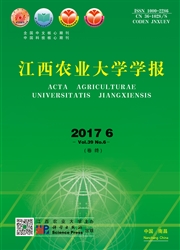

 中文摘要:
中文摘要:
为探讨杉木凋落物中低分子有机酸对杉木种子天然更新的影响,采用室内模拟试验,以课题组前期研究筛选的杉木凋落物源优势低分子有机酸(草酸、丙二酸、苹果酸、柠檬酸)及其混合酸的不同浓度溶液处理杉木种子,探讨其对杉木种子萌发、幼苗生长和抗氧化特性的影响。结果表明:低浓度(0.5-5 mmol/L)外源低分子有机酸能促进种子萌发及幼苗生长,高浓度(≥50 mmol/L)则表现为抑制杉木种子萌发和幼苗生长的作用,且对杉木幼苗具有严重的伤害作用。各处理中,以0.5 mmol/L混合酸处理杉木种子发芽率及发芽势最高,分别为79.0%和35.5%,较对照分别提高59.6%和163.0%,差异显著,而且对促进幼苗生长的作用亦最强。故混合酸与单一有机酸相比更有利于杉木种子萌发和幼苗生长,对幼苗的伤害程度亦最低。
 英文摘要:
英文摘要:
In order to investigate the effect of low molecular organic acids on the natural regeneration of Cunninghamia lanceolata seed,an indoor simulated experiment was conducted.The low molecular organic acids (oxalic acid, malonic acid, malic acid and citric acid) that were selected by the research group in the previous study and its mixed acid solution with different concentrations were used to treat the Cunninghamia lanceolata seed and to explore their impacts on the seed germination, seedling growth and antioxidant properties.The re- sults showed that low concentration (0.5-5 mmol/L) of exogenous low molecular organic acids could promote the seed germination and seedling growth, high concentration ( t〉 50mmol/L inhibited the seed germination and seedling growth of Cunninghamia lanceolata, and had serious harm to Cunninghamia lanceolata seedlings.In series treatments,the highest germination rate and germination potential of Cunninghamia lanceolata were 79.0% and 35.5%, respectively,in the 50 mmol/L mixed acid treatment, increased by 59.6% and 163%, compared with the contrast, respectively, and also had the strongest effect on promoting seedling growth. Overall, compared with the single organic acid, the mixed acid was more favorable to the seed germination and seedling growth of Cunninghamia lanceolata, and the damage degree to the seedling was the lowest.
 同期刊论文项目
同期刊论文项目
 同项目期刊论文
同项目期刊论文
 期刊信息
期刊信息
